Oswald Külpe Prize

The Oswald Külpe Prize was created in 2004 in memory of Oswald Külpe and the Würzburg School of Thought Psychology, which he founded. This award honors internationally outstanding scientists who use experimental methods to investigate higher mental processes. The prize was donated by Fritz Strack, a Würzburg professor of social psychology, who initially remained anonymous until the award ceremony in 2013. The foundation's assets totalled 100,000 euros. The Institute of Psychology at the University of Würzburg is responsible for selecting the winners and awarding a prize.
Laureate 2021: Professor Jan De Houwer

Professor Jan De Houwer, born in 1968, was awarded the 2021 Oswald Külpe Prize by the Institute of Psychology at the Julius Maximilans University of Würzburg. Professor Wilfried Kunde, Director of the Institute, presented the certificate on November 19, 2021 at an online ceremony in Würzburg.
Jan De Houwer is Professor of Psychology at Ghent University in Belgium. He received the Prize for his outstanding research achievements in the experimental investigation of higher mental processes. He follows in the tradition of Oswald Külpe, who founded the "Würzburg School" of Thought Psychology.
The laudatory speech was held by Professor Roland Deutsch. He emphasized that Jan De Houwer's research has been published in "remarkably large numbers in the best journals" in his field.
The great influence of this work is reflected in numerous prizes and exceptionally frequent citations by other scientists. For example, the Belgian psychologist received the "Mid-Career Award 2020" from the Psychonomic Society. He has also received repeated funding from the Flemish government's renowned Methusalem programme.
According to Roland Deutsch, Jan De Houwer's work on learning processes in particular illustrates his achievements in researching higher mental processes. His theoretical arguments and experimental research results make it clear: Learning processes, which have long been described as passive and based on simple linking processes, are influenced by abstract thinking, reasoning processes, goals and conscious memory.
The award winner was able to prove, for example, that learning effects that were previously assumed to be based on well-practiced associations can be changed or created through mere verbal intructions or logical conclusions and without further practice.
Laureate 2019: Prof. Dr. Paul van den Broek
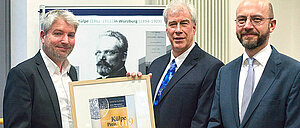
Professor Paul van den Broek is one of the most distinguished researchers in the psychology of text comprehension and learning with texts. His research combines basic experimental research on reading, learning and text comprehension with applied questions such as how to improve reading comprehension in children with learning and achievement problems. Professor van den Broek has been instrumental in researching the cognitive structures and processes involved in learning and reading from early childhood to adulthood. He developed the "landscape model" of reading - a theory implemented as a computer model that is one of the most important theories in the psychology of text comprehension. The landscape model provides a precise modelling of the interplay between passive, text-driven, memory-based cognitive processes on the one hand and active, reader-initiated, strategic processes on the other.
Professor van den Broek was awarded the Oswald Külpe Prize 2019 at a ceremony held on November 9 in the Oswald Külpe lecture hall of the University of Würzburg. In a welcoming address, Vice President Professor Barbara Sponholz pointed out the merits of Professor van den Broek for use-inspired basic psychological research. In the laudatory speech that followed, Professor Tobias Richter described how Professor van den Broek's work has significantly influenced the psychology of text comprehension. In his lecture entitled "Constructing meaning from text: Passive and reader-initiated processes", Professor van den Broek gave a vivid overview of his research.
Professor van den Broek is professor of Cognitive and Neuro-biological Foundations of Learning and Teaching and director of the Brain and Education Lab at Leiden University in the Netherlands. At the same university he began his academic career with a degree in psychology. After receiving a PhD in psychology from the University of Chicago in 1985, he was Professor of Educational Psychology at the University of Minnesota in Minneapolis. In 2008, he returned to Leiden to start his current position while still maintaining an affiliation with the University of Minnesota as a professor of cognitive science. Paul van den Broek's work has received numerous awards, including the Distinguished Scientific Contributions Award of the Society for Text and Discourse.
Laureate 2017: Prof. Dr. Jan Born
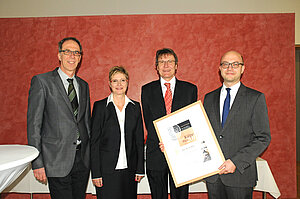
Professor Jan Born was one of the first scientists to experimentally investigate the significance of sleep for memory formation. He found out that memory is strengthened during sleep and that problem-solving strategies also continue during sleep. In further very innovative studies he was able to prove that not REM sleep, but deep sleep is crucial for the transfer of information into the long-term memory of the brain and thus for memory formation.
In his keynote lecture, Jan Born gave an overview of his life's work to date. In his opinion, the memory function is the most important function of sleep. At the same time, it is only surprising at first glance that memory is strengthened in a state in which man is unconscious: In the waking state, the transfer of contents into the long-term memory of the brain cannot function because then there are too many collisions with the regular processing of stimuli. The brain would simply be overwhelmed.
Jan Born studied psychology and mathematics in Tübingen and Ulm. He then worked as a professor in Bamberg and Lübeck before returning to his roots in 2010 when he became director of the Institute of Medical Psychology and Behavioural Neurobiology at the University of Tübingen. Jan Born was, among other things, speaker of the DFG research group "Memory formation during sleep" and was head of the Collaborative Research Centre "Plasticity and Sleep". In 2009 he became a member of the National Academy of Sciences Leopoldina, and in 2010 he received the Gottfried Wilhelm Leibniz Prize of the DFG.
Website Prof. Jan Born
Laureate 2015: Prof. Dr. Norbert Schwarz
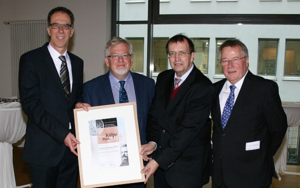
Norbert Schwarz is regarded as one of the most frequently cited social psychologists worldwide. In numerous works he has investigated how attitudes and judgements form and change. He found that spontaneous influences of a situation play a more important role than stable characteristics of the person. He also gained important insights into the influence of feelings and moods on judgment.
For his outstanding research in this field, the award-winning psychologist has now also received an award from the Würzburg Institute of Psychology. On November 20, 2015, he received the Oswald Külpe Prize. At the award ceremony, Schwarz also gave insights into his work - at a lecture entitled: "I wonder if there is anything to it. Intuitive truth judgements and the correction of misinformation".
At the ceremony in the Külpe lecture hall at the Röntgenring, the director of the institute, Professor Paul Pauli, described the presentation of the prize as one of the highlights in the life of the institute. University President Alfred Forchel congratulated Schwarz on the award and recalled the long tradition of Würzburg psychology. Professor Fritz Strack, the founder of the Külpe Prize, finally delivered the laudatory speech.
https://dornsife.usc.edu/norbert-schwarz/
Laureate 2013: Prof. Dr. Anke Ehlers
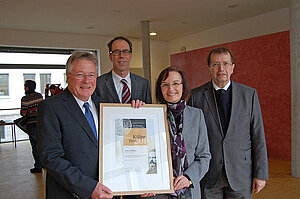
Professor Anke Ehlers (Oxford) is a leader in post-traumatic stress disorder research. She was awarded the Oswald Külpe Prize on Friday for her achievements in this field. Surprise at the celebration: The previously anonymous founder of the prize revealed himself.
Post-traumatic stress disorder, PTSD for short: This disease occurs in some people who have experienced horrible things, such as a bomb attack, a serious accident or a rape. Those affected experience the terrible situation again and again in a very intensive way - as if the situation were real again.
The media have recently reported on PTSD, for example in connection with soldiers returning from war missions. PTSD is also often found among asylum seekers who have experienced terrible things during their flight.
Anke Ehlers from Oxford University is one of the world's leading scientists in the research and treatment of this disorder. The Institute for Psychology of the University of Würzburg has now honored the achievements of the professor in this field with the Oswald Külpe Prize. Ehlers received the award on November 29 at a ceremony in the Oswald Külpe lecture hall at the Röntgenring.
https://www.psy.ox.ac.uk/team/anke-ehlers
Laureate 2011: Prof. Dr. Wolfgang Prinz
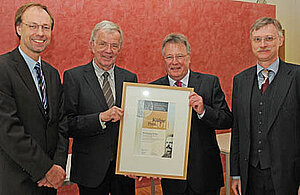
Wolfgang Prinz received the prize for his complete scientific work - and for continuing the time-honored tradition of the Würzburg School of Thought Psychology in modern cognitive psychology, as psychology professor Wilfried Kunde said in his laudation.
Since the mid-1980s, Wolfgang Prinz has been very interested in the subject of behavioral control. Until then, the processes of perception and movement control in psychology were rather considered separately from each other. At the time, Prinz presented a radical alternative concept to this, which became known as "common coding".
His basic assumption: perception and behavior are so closely intertwined that it is hardly possible to say where perception ends and behavior begins. This is the case, for example, when a person imitates someone - spontaneously and without intention. "Babies do this only a few days after birth," says Kunde.
The common coding approach has stimulated a very successful research program. Prinz's research group showed many interactions between perception and behavior. A particularly astonishing finding: "Not only what we perceive influences our movements. The way we move also determines our perception," said Kunde. Example: The planning of a movement with the right hand can make people more or less blind to objects that also have to do with the characteristic "right", such as arrows pointing to the right.
Laureate 2009: Prof. Dr. Michael Tomasello
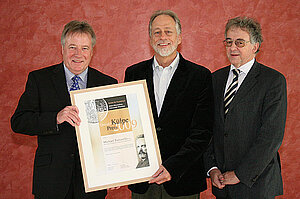
Michael Tomasello receives the prize for his outstanding contributions to the experimental investigation of higher mental processes - especially for his work comparing the development of thought and communication processes in children and primates.
"His findings have greatly impressed scientists from various fields: developmental, social and cultural psychologists, anthropologists and philosophers," said Wolfgang Schneider, professor of psychology at Würzburg University, in his laudation.
Tomasello has published his research results in considerably more than 300 publications, including the top journals Nature and Science as well as the most important journals for developmental psychology. His work has also been cited by other scientists far more often than average - a clear sign of its extraordinary importance.
https://www.mpg.de/369291/anthropologie_wissM3
Laureate 2007: Prof. Dr. Richard E. Nisbett
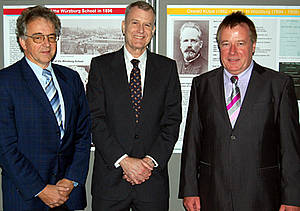
Nisbett is Professor of Social Psychology at the University of Michigan at Ann Arbor. In the course of his long career as a researcher, he has repeatedly dealt with the question of how people make decisions and what influences they are subject to. "This made him an ideal candidate for this award," said Laudator Strack, director of the Institute of Psychology, in his speech. Nisbett's outstanding achievements in this field had led the prize committee to unanimously vote for him.
In the mid-1970s, Nisbett, together with his colleague Lee Ross, tackled an area of research that quickly developed into "one of the most influential research programs in our field," Strack said. Nisbett and Ross published their findings on strategies and errors in human decision-making in 1980, where they were able to prove that a whole range of different reasons can be responsible for erroneous decisions, "reasons that are not the result of a particular motivation but the result of cognitive processes that underlie human decisions," Strack said.
"Telling more than we can know: Verbal reports on mental processes" was the provocative title of another publication published by Nisbett in 1977. In this publication, the psychologist showed that people believe they can explain their decisions and behavior, but they do not actually know the real reasons. Or the other way around: "Human behavior is influenced by factors that lie outside conscious perception," as Strack said.
In recent years, Nisbett has researched one of these factors more intensively: the influence of the culture in which people grow up. In 2003 he published the book "The geography of thought: How Asians and Westerners think differently...and why". "His work in this field has revived 'cultural psychology' as an experimental discipline," Strack said. All in all, Nisbett has contributed a great deal to the fact that the experimental investigation of higher mental processes continues to play an important role within psychology - and is thus a worthy winner of the Oswald Külpe Prize.
http://www-personal.umich.edu/~nisbett/
Laureate 2005: Asher Koriat
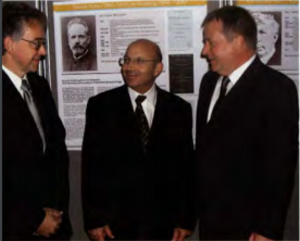
Koriat's work particularly fulfills the intention of the Külpe prize, which aims to honor outstanding scientists who use experimental methods to explore higher cognitive processes. The professor from Haifa has shown, among other things, that an interaction of retrieval and judgment processes is necessary for memory. He has also demonstrated that the assessment of one's own knowledge and mental functioning is fundamental for controlling learning processes.
http://iipdm.haifa.ac.il/index.php/koriat-publications






